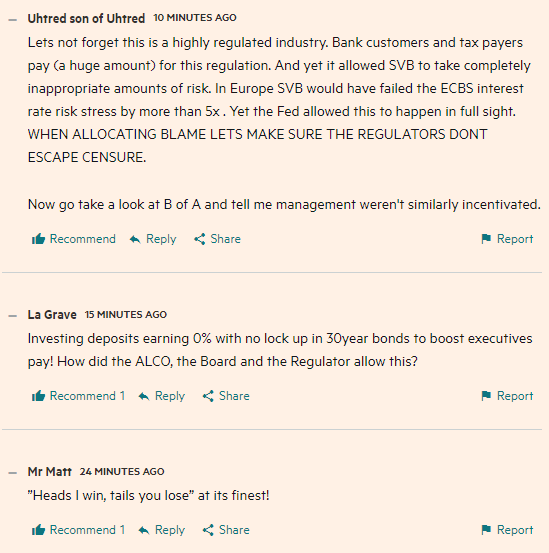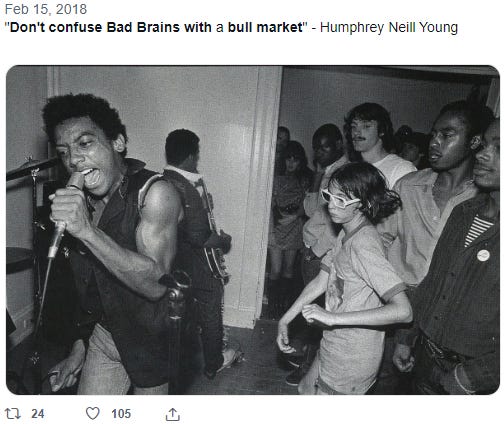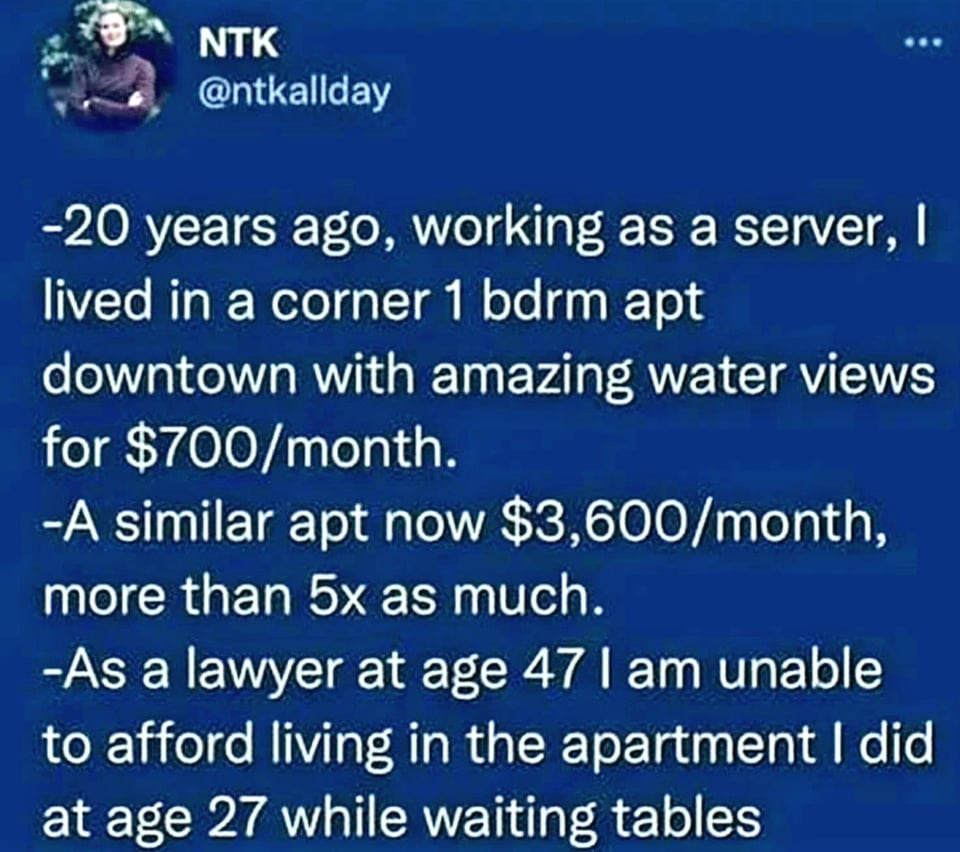Who was the last Fed chair to run an actual bank?
"What debt does is it brings forward demand from the future." - Paul Hodges, 2019
Banking panics are “pretty common things, but when you’re in the midst of one, I think it’s easier to lose that context - Oh my God! The world is over, banks are going to go out of business! - but really it’s a pretty regular thing in the financial system.”
John Maxfield with Adam Taggart

“When historians come to look at this, with the benefit of hindsight,
they’ll say it was really Ben Bernanke that broke it.”
(not if the historians are Jon Hilsenrath, Nick Timiraos, Jenna Smialek or Andrew Ross Sorkin)
After a series of frantic calls and government-orchestrated meetings in Bern, UBS agreed to swallow Credit Suisse for $3.2 billion. To seal the deal, the government, which had vowed after the 2008 crisis never again to use public money to save a bank, hastily used emergency laws to do exactly that.
Executive pay at Silicon Valley Bank soared after the bank embarked on a strategy to boost profitability by buying riskier assets exposed to rising interest rates…The jump in pay for chief executive Greg Becker and chief financial officer Daniel Beck was a result of large multiyear bonus awards pegged to the bank’s return on equity (RoE)…Becker’s cash bonus peaked at $3mn in 2021, more than double the amount he received four years earlier. Beck earned a $1.4mn bonus in 2021, more than four times the amount he received in 2017 after joining the company.
The higher bonuses helped push Becker’s total pay to $10mn in 2021, an increase of almost 60 per cent compared with four years earlier. Beck earned nearly $3.8mn, a jump of roughly double over the same time period.
Current and former SVB executives told the Financial Times that SVB boosted returns by buying long-term paper, especially mortgage bonds, that bolstered earnings because they generated higher yields. The strategy backfired when interest rates rose sharply and depressed the value of the bonds.
Ten-million bucks to run a taxpayer-backed bank? Becker should’ve made $150k and been happy to have a job.
They gambled bank funds to get a bigger payday. Heads they win, tails we lose.
Are all those millions going to be clawed-back? And thanks to Janet “Peter Principle” Yellen, we’re all on the hook for this mismanagement.
From the FT comments:
The problem is systemic.
First Republic Bank Founder Earned a Big Payday—as Did His Family Members
Earned?
First Republic Bank paid family members of its founder, James Herbert, millions of dollars for work at the lender in recent years, including for consulting services related to interest rates and risk, according to public disclosures the bank made as part of annual filings. The bank paid Mr. Herbert, who was chief executive before stepping into the executive chairman role last year, $17.8 million in 2021, the bank’s disclosures for that year said.
$17.8 million to run a taxpayer-backed bank??
Warren Buffett pays himself $100k.
Taxpayer-backed banks should be run like boring, highly regulated utilities.
i.e., Nobody should be a billionaire from running a taxpayer-backed bank (and all of the big banks would've failed in 2008, and probably 2020, without bailouts.)
If you want to get hedge fund money, fine. Go start a hedge fund - without FDIC backing.
(The problem with this idea is that the government and Fed now backstop hedge funds, if they’re big or connected enough.)
"Some people talk about the Federal Reserve coming in and spending all this money to support the credit markets and to inject liquidity into the system - it was not meant for middle-class America. It was not. This was bailing out many of these billion-dollar hedge funds..."
- Chris Cole, November 2020
Rational Walk adds some color here: First Republic Bank's Proxy Statement
A point I want to make - I’ve learned over the years that it is not unusual to find wealthy and/or very influential people - CEO’s, PhD’s, generals, politicians, asset gatherers, pundits, etc. - who just aren’t that smart.
Signature Bank Deal Sticks FDIC With $11 Billion ‘Dead Assets’
Left behind is the commercial real estate debt portfolio, weighted heavily toward multifamily buildings bound by a law that restricts landlords’ ability to raise rents. “It’s toxic waste,” said Christopher Whalen, chairman of Whalen Global Advisors. “From an investor point of view, these are dead assets.”
“There was something clearly wrong with every single person I was meeting,” Ben says of his travels in crypto land. “There was clearly a systematic deeper rot at the heart of all this I didn’t quite know how to process.”
I have a copy of friend of the show Marc Cohodes’ heavily-footnoted 19-page letter he sent on January 29, 2023 to the FDIC General Counsel warning about Signature Bank.
A few excerpts:
Introduction:
The citations below and attached exhibits contradict Signature Bank’s (“SBNY”) claims about the robustness of its BSA/KYC/AML procedures generally and, in particular, for its “walled garden” for crypto clients. It is highly unlikely that SBNY has performed the diligence and “thorough vetting” processes that it has reported. And it is doubtful that SBNY will do an adequate job in the future as regards its crypto clients, and its private blockchain-based network, “SigNET.” There are intractable problems with banking offshore-based, crypto exchanges and stable coins, which either provide intermediate payment rails for criminal enterprises, or are criminal enterprises, in a responsible BSA/KYC/AML manner…
SBNY opened in 2001 and decided to “move to crypto” in the first quarter of 2018. SBNY hired away a team of individuals who worked for Metropolitan Commercial Bank. This team had previously onboarded crypto clients such as Tether Holdings, Ltd., Ifinex, Inc., and Digfinex, Inc. SBNY’s revenues and assets climbed quickly, far surpassing the revenue growth of major, first-tier, traditional banks. The stunning deposit growth between 2019-2022 appears to have been fueled by SBNY’s new, blockchain-based, digital payments platform SigNET and the billions in dollar deposits backing “stable coins.” SigNET allowed SBNY’s crypto clients (crypto exchanges, crypto miners, crypto hedge funds, and crypto “whales”) to transfer money (tokenized dollar deposits, or “signets”) instantaneously to and from other SBNY commercial clients, 24/7. This was likely a mechanism by which many SBNY SigNET clients purchased and redeemed stable coins, such as Tethers.
SBNY investor relations quoted Sam Bankman-Fried:
“Partnering with Signature Bank, an established financial institution and fintech pioneer, will allow us to continue to grow our business by leveraging all the advantages and key aspects of Signet. The implementation of an API-enabled, blockchain-based digital payments platform to initiate blockchain transactions and Fedwire transactions via Signet is just the latest move toward revolutionizing the payments industry through the power of blockchain technology.”
Deposits related to SigNET at one point amounted to 36.4% of SBNY’s total deposits. As of Q3/2022, $37.4 billion of SBNY’s deposits were directly relatable to crypto activities on SigNET. SBNY’s loan portfolio grew from $700 million at the end of 2018 to $28.8 billion by Q3/2022. SBNY disbursed SBA PPP loans to crypto firms like Alameda Research. This concentration of deposits from crypto clients, and potentially loans to the same, presented obvious and completely foreseeable risks. As crypto clients began to blow up in the second quarter of last year, SBNY’s crypto deposits declined in Q4/2022 to a reported $6.1 Billion. SBNY had to borrow over $11 billion from the Federal Housing Finance Agency in 2022 to be in a position to meet potential crypto withdrawals.
Other highlights include the items below:
“SBNY Offers Banking Services to Suspect Offshore Entities”
“SBNY has Failed to Comply with its BSA/KYC/AML Duties”
SBNY’s Customers are “Known to be Involved in Money Laundering and
Other Criminal Activities”
Cohodes also has paragraphs on the relationships between Signature Bank and FTX, Binance, Bitso, Genesis Block OTC, Genesis Trading, Houbi/Tron/Justin Sun, Celsius Network, OKCoin, Voyager, Nexo and Services OU.
I am not a crypto-guy or banking regulator, so I can add nothing to Cohodes’ research. My point here that there were obvious warning signs that were ignored.
Time to ask what the directors were doing at these failed banks Where were the regulators? It’s a fair question after the failure of several ostensibly supervised banks…Even so, there is an equally pressing question to answer: where were the directors?
Should investors have fretted that just one of SVB’s independent directors had serious banking experience, for example, and that he did not sit on its risk committee. (One director who did brought “deep experience in the premium wine industry”.) Over at Signature, which once gave Ivanka Trump a board seat, the risk committee was similarly short of bankers, other than Signature’s co-founders and chief operating officer.
Accounting-Fraud Indicator Signals Coming Economic Trouble
Is accounting fraud even illegal anymore?
(You can almost see the fraud bubbling right when Powell chickened-out pivoted that last time, in early 2019, about $5 trillion ago...in Fed balance sheet terms.)
When you look at the latest fed funds expectations, the market sees the funds rate at 3.69% by year-end. That’s a bit more than 100bps of cuts from the current effective funds rate of 4.83%. Recall the Fed’s latest forecast from Wednesday had no cuts until 2024. The futures market is also indicating the Fed has already reached its terminal rate while the Fed is still looking at another 25bps hike. Something’s going to have to give here, but for now the market has been pressing its bet vs. the Fed as banking sector confidence continues to be shaken, despite the best efforts of Treasury and Fed officials to say otherwise.
Seems to me all that’s happened so far is that house prices have simply gone back to levels they were less than a year before the biggest bubble of all time peaked.
You may remember I had a post from July 2022 titled, QT stands for "They lie.”
‘Zoom Towns’ Exploded in the Work-From-Home Era. Now New Residents Are Facing Layoffs
The 42-year-old mother of five relocated from Portland, Oregon, to Florence, Alabama, in 2021. Milliman had a remote job with Amazon paying $120,000 a year, including bonus. In the upheaval of the pandemic, she and her husband wanted a change and started looking on “Zillow, everywhere.” A program called Remote Shoals, offering a cash grant to relocate to northwestern Alabama, tipped the scales in favor of Florence.
They bought a house three times the size of their Portland home. It had twice the mortgage payment, too. But in Florence on a six-figure salary, they could handle it. There was a creek behind their home and Milliman was enchanted with the natural beauty and culture of her new community.
Less enchanting? Losing her job last year.
See Zoomtown Rats.
Great discussion with three friends of the show: The Next Phase Of The Banking Crisis | Joseph Wang & Randy Woodward
MacroVoices #368 Charlie McElligott: Banking Crisis, FOMC, 0DTE, CTAs & more: “When you don’t have access to perpetual funding at zero, these models don’t work.”
Conflict in Syria Escalates Following Attack That Killed a U.S. Contractor Why are we in Syria again? To provide Al Qaeda with air cover? Did Syria attack Rhode Island or something? If Syria is such an existential threat to the U.S., Congress should vote for a declaration of war, and we can raise taxes to pay for it!



















If appointed, I will serve, and discharge this duty with single minded dedication
Failed Banks--time to set an example:
Clawback Senior Management bonusses and stock option profits-ban from future fin. industry
Clawback all Board compensation--ban from future Boards
Regulators: exit all involved at all levels-ban from future govt jobs